[Interactive e-learning courses in human genetics: Usage and evaluation by science and medical students at the faculty of medicin]
Frank Oeffner 1Christine Schäfer 2
Barbara Fritz 1
Aurelia Lara Fuchs 3
Alexander Rauschendorf 4
Rainer König 5
Jürgen Kunz 6
1 Philipps-Universität Marburg, Zentrum für Humangenetik, Marburg, Deutschland
2 Philipps-Universität Marburg, Fachbereich Medizin, Dekanat, Marburg, Deutschland
3 Ruprecht-Karls-Universität Heidelberg, Abteilung BIOQUANT, Heidelberg, Deutschland
4 Universitätsfrauenklinik Heidelberg, Heidelberg, Deutschland
5 Johann Wolfgang-Goethe Universität Frankfurt, Institut für Humangenetik, Frankfurt/Main, Deutschland
6 Institut für Medizinische Molekulardiagnostik GmbH, Berlin, Deutschland
Abstract
Introduction: This study presents our online-teaching material within the k-MED project (Knowledge in Medical Education) at the university of Marburg. It is currently organized in five e-learning modules: cytogenetics, chromosomal aberrations, formal genetics, fundamentals of molecular diagnostics, and congenital abnormalities and syndromes. These are basic courses intended to do the educational groundwork, which will enable academic teachers to concentrate on more sophisticated topics during their lectures.
Methods: The e-learning modules have been offered to a large group of about 3300 students during four years at the Faculty of Medicine in Marburg. The group consists of science students (human biology) and medical students in the preclinical or the clinical period, respectively. Participants were surveyed on acceptance by evaluating user-tracking data and questionnaires.
Results and Conclusion: Analysis of the evaluation data proofs the broad acceptance of the e-learning modules during eight semesters. The courses are in stable or even increasing use from winter term 2005/06 until spring term 2009.
Conclusion: Our e-learning-model is broadly accepted among students with different levels of knowledge at the Faculty of Medicine in Marburg. If the e-learning courses are maintained thoroughly, minor adaptations can increase acceptance and usage even furthermore. Their use should be extended to the medical education of technical assistances and nurses, who work in the field of human genetics.
Keywords
Human genetics, e-Learning, evaluation, multimedia
Introduction
k-MED (Knowledge in Medical Education) is an independent internet based learning platform designed for undergraduate or continuing biomedical education. Together with ist predecessors k-MED has been continuously sponsored by the Ministry of Science and Arts of the state of Hessia from 1999 until termination of funding in 2009. From January 2001 up to April 2004 it was additionally supported by a grant from the German Federal Ministry of Education and Research (BMBF) within the support program “New Media in Education”. Meanwhile k-MED has been established as a new institution at the medical deaneries of Hessian Justus-Liebig and Philipps university. It evolved from a single medical subject project to a service provider of comprehensive technology and content for authors and learners [1]. The platform is based upon the sophisticated open source learning management system (LMS) ILIAS (
The new “Approbationsordnung für Ärzte” – a federal law regulating medical education für physicians’ licensing, that has come into effect in Oct 1
[3]. Our material may not only provide a means to enhance learning efficacy, but interactions between teachers and students may also become more intensive using an online communication forum, a central storage place for scripts, links and course schedules.
Methods
Project
Actually our online-teaching material is organized in five – partially interactive - e-learning modules (see Figure 1 [Fig. 1]): cytogenetics, chromosomal aberrations, formal genetics, fundamentals of molecular diagnostics, and congenital abnormalities and syndromes (see Table 1 [Tab. 1]).
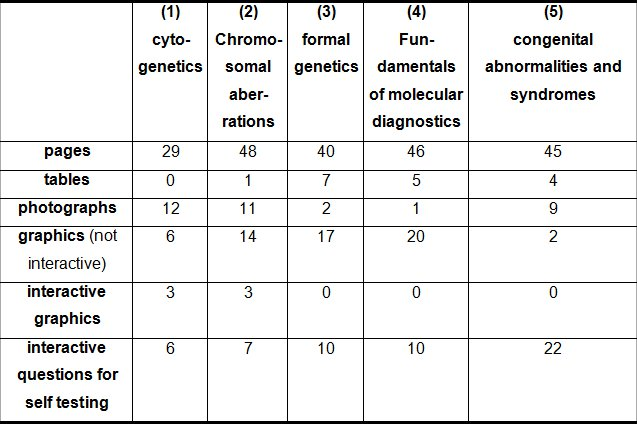
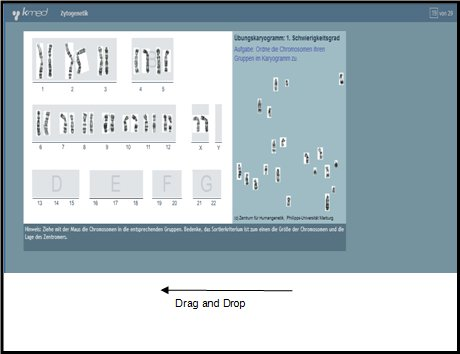
These are basic courses intended to supplement the traditional learning scenario. During the academic year (winter and summer term) about 750 – 800 students at the faculty of medicin attend courses in human genetics. The aforementioned e-learning modules are integrated in the canonical curriculum within the framework of a new blended learning scenario. The users comprise about 50 students of human biology, about 440 medical students at the beginning of their preclinical study period and approximately 300 medical students in their clinical period (7
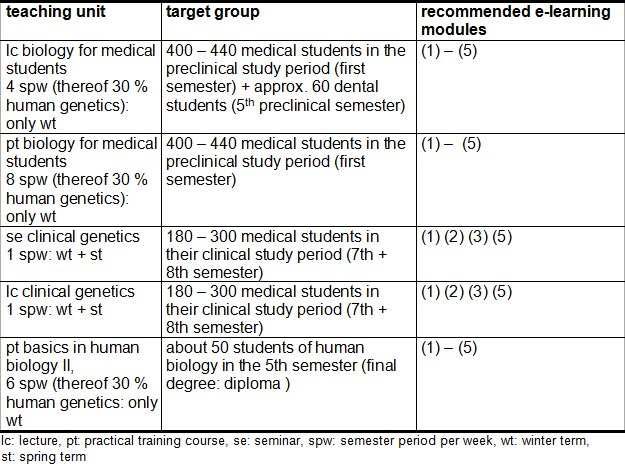
In principle, all groups receive the same e-learning modules, but the underlying education concept depends from the respective study course:
Students of human biology (diploma) are provided with the online material to prepare for the practical training course in human genetics and the written examination in the 5
Evaluation of the e-learning modules in human genetics
To be surveyed on user friendliness and acceptance user-tracking data for the learning modules (number of accesses and averaged duration of access) (see Table 3 [Tab. 3] and 4 [Tab. 4]) and also questionnaires (see Figure 2 [Fig. 2]) were evaluated.
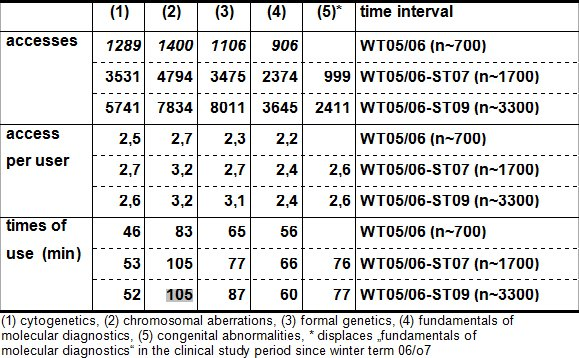
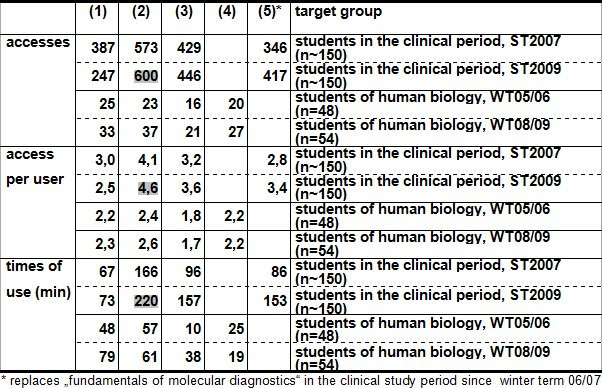
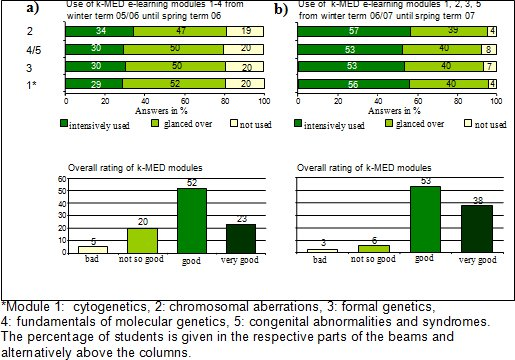
Table 3 [Tab. 3] presents the intensity of use of the collective group in winter term 05/06 and the respective cumulative use until summer term 07 and 09. (data source: usertracking performed by the LMS). Outstanding figures are marked in grey.
Table 4 [Tab. 4] shows the intensity of use of students in the clinical period in spring term 07 and 09, and of students of human biology in winter term 05/06 and 08/09, respectively
Access is defined as login into a distinct e-learning module (e. g. cytogenetics comprising 29 pages). Due to technical problems – e. g. caused by introduction of the new open source learning platform ILIAS (
The questionnaire recorded self-estimated times of use and an evaluation of the overall quality of the e-learning modules. To that end we used a four-step scale for answers (bad, not so good, good, very good. The same standardized questionnaire was handed out five tims in winter term 05/06, spring term 06, winter term 06/07, spring term 07, and spring term 09 immediately after the written test covering clinical genetics for medical students in the clinical period (7
Results
The evaluation and comparison of the times of use proves a stable or even increasing acceptance of the e-learning modules from winter term 05/06 (integration of the online modules into the mainstream curriculum of human genetics) until spring term 2009 (see Table 3 [Tab. 3] and 4 [Tab. 4]). On an average each of our e-learning modules is accessed twice or more – with the exception of “formal genetics” with students of human biology). Apart from the relative short processing time having been spent on the modules “formal genetics” and “fundamentals of molecular diagnostics” in the human biology group (see Table 4 [Tab. 4]) the average access time reaches over 45 minutes – independently from study class or semester, respectively. In this context we note a strikingly high use of the module “chromosomal aberrations”. Obviously, this online teaching unit providing a lot of clinical content satisfies the concerns and learning demands of medical students in the clinical period in a particular way. Table 3 [Tab. 3] and 4 [Tab. 4] proove that students in the clinical period use this module most intensively (e. g. 220 minutes average time of use versus 105 minutes cumulative average time of use in the collective group). Students of human biology, who prefer a more scientific focus, display significantly shorter times of use being stable from winter term 05/06 until winter term 08/09 (57 and 61 minutes, respectively). Figure 2 [Fig. 2] presents a survey of the evaluation during four semesters in the clinical study period. Both of the groups (winter term 05/06 + spring term 06 and winter term 06/07 + spring term 07) differ by the substitution of the module “fundamentals of molecular diagnostics” for “congenital abnormalities”. The rating of our e-learning units is strikingly better when compared to the evaluation of winter term 05/6 and spring term 06, respectively. This applies to the use of distinct modules (WT 05/06 - ST 06: 29-34% intensively used; WT 06/07 – ST 07: 53-57%) and also to the overall rating of our online teaching scenario (WT 05/06 – ST06: 23% very good; WT 06/07 – ST 07: 38% very good). The differences observed in times of use and intensity of use between both groups are significant.
Discussion and Conclusion
Since this evaluation study has been made anonymously, we could not calculate a coefficient of correlation relating times and intensity of use provided by the questionnaire and the data from online user-tracking. However, another study has already proven that information given by students correlate with the “real“ parameters from user-tracking [4]. Hence, we conclude that the questionnaire provides reliable results mirroring the learning and study habits of the interviewees. The growing acceptance of our e-modules in human genetics is probably co-determined by the fact that k-MED together with its e-learning modules has been increasingly used in other study groups during the last years. Some kind of blended e-learning scenarios has already become a matter of course at the universities in Giessen and Marburg. When comparing the acceptance of the modules “formal genetics” and “fundamentals of molecular diagnostics” between natural scientists (students of human biology) and medical students, the latter group seems to benefit significantly more than students of human biology. This observation may be explained by the diverse conception of the two study courses. The relative low acceptance of module “fundamentals of molecular diagnostics” with medical students during the clinical study period has most likely two reasons: On the one hand the low level of difficulty of that module is obviously inappropriate for students in advanced semesters (7
Finally, we come to the conclusion that our e-learning scenario is broadly accepted among students with different levels of knowledge (natural scientists and medical students in the preclinial and the clinical period, respectively), although it has been implemented for the optional use. We could not confirm a low acceptance rating, which had been observed in single cases of other k-MED online course (e. g. access rates of 10% during one semester) [1]. In this context one has to be aware of the fact that our e-learning modules are recommended by the teaching staff within a blended learning scenario at the beginning of each semester. The advantages of self-directed learning, which is (mostly) time- and location-independent, obviously outweigh the additional amount of work reflecting the results from other studies [1], [5]. The participating teachers benefit as well, because work burden is relieved in the online and the classical teaching courses through new communication forums. Minor adaptations such as the exchange of the barely accessed e-module “fundamentals of molecular diagnostics” for “congenital abnormalities and syndromes” in the clinical study period could heighten acceptance and usage even more (see Figure 2 [Fig. 2]). To our knowledge there is – at least in the German speaking countries - no similar project for teaching the basics in human genetics. Since we know from experience that online tests are highly accepted by teachers and learners at the faculty of medicine in Marburg [6], we recommend the implementation of online options for testing also in human genetics. Gresty and coworkers [7] could show that there is an awareness of the growing importance of human genetics and at the same time a high acceptance of online teaching courses among employees in the health care system. Therefore, our online genetics resource seems suitable for instruction and education of assistant medical technicians and nurses, as well. Surely, this statement has to be verified by evalutation studies similiar to this work.
At the faculty of medicin in Marburg e-learning modules have already been evaluated with regard to the students‘ success rates in exams and practical courses
[8]. In the framework of a successor project such a study appears as an important supplement of the present evaluation of use and acceptance.
Notes
Parts of this work have been presented on the 19
Acknowledgement
We are deeply indebted to Mrs. Maria Siegert and Mr. Cord Süße – psychologists of the k-MED community. The project has been funded by the Ministry of Science and Arts of the state of Hessia.
Competing interests
The authors declare that they have no competing interests.
References
[1] Wagner R, Zenker D, Schäfer C, Schneider S. k-MED – vom lokalen Projekt zum e-Learning-Dienstleister. GMS Med Inform Biom Epidemiol. 2006;2(3):Doc13. Zugänglich unter/available from: http://www.egms.de/static/de/journals/mibe/2006-2/mibe000032.shtml[2] Henning J, Dewal G, Quenzer M. ILIAS - Die Open Source Lernplattform: Handbuch für Nutzer, Dozenten und Administratoren. Berlin: uni-edition; 2009.
[3] Schäfer MS, Weißflog G. Einstellungen von Medizinstudentinnen und – studenten zu humangenetischer Forschung und genetischer Diagnostik. GMS Z Med Ausbild. 2005;22(2):Doc21. Zugänglich unter/available from: http://www.egms.de/static/de/journals/zma/2005-22/zma000021.shtml
[4] Schäfer C, Siegert M, Schunk A, Schneider S, Glowalla U, Koolman J. Biochemie/Molekularbiologie für Mediziner: Eine Einführung mit Vorlesung, Seminar und Multimediaelementen. GMS Z Med Ausbild. 2005;22(4):Doc217. Zugänglich unter/available from: http://www.egms.de/static/de/journals/zma/2005-22/zma000217.shtml
[5] Gotthardt M, Siegert MJ, Schlieck A, Schneider S, Kohnert A, Groß MW, Schäfer C, Wagner R, Hörmann S, Behr TM, Engenhart-Cabillic R, Klose KJ. How to Successfully Implement E-learning for both Students and Teachers. Acad Radiol. 2006;13(3):379-390. DOI: 10.1016/j.acra.2005.12.006
[6] Glowalla U, Schneider S, Siegert M, Gotthardt M, Koolman J. Einsatz wissensdiagnostischer Module in elektronischen Prüfungen. Rostock: DeLFI 2005 3. Deutsche e-Learning Fachtagung Informatik, 13. - 16. September 2005. Zugänglich unter/availabel from: http://subs.emis.de/LNI/Proceedings/Proceedings66/GI-Proceedings.66-26.pdf
[7] Gresty K, Skirton H, Evenden A. Addressing the issue of e-learning and online genetics for health professionals. Nurs Health Sci. 2007;9(1):14-22. DOI: 10.1111/j.1442-2018.2007.00296.x
[8] Rost B, Koolman J. Evaluation von multidmedialen e-Lernkursen zur Vorbereitung auf ein biochemisches Praktikum. GMS Z Med Ausbild. 2009; 26(1):Doc11. DOI: 10.3205/zma000603
[9] Oeffner F, Fuchs A, Rauschendorf M, Mützel T, Fritz B, König R, Kunz J. k-MED: Multimedia Education in Human Genetics. Med Gen. 2008;20:P304.




